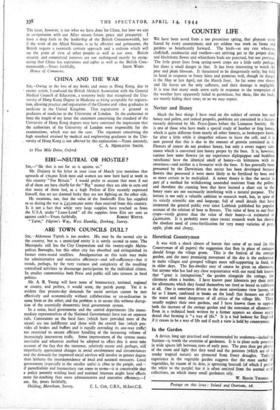ARE TOWN COUNCILS DULL?
SIR,—Alderman Tiptaft is too modest. His may be the second city in the country, but as a municipal entity it is surely second to none. The Metropolis still has the City Corporation and the twenty-eight Metro- politan Boroughs, but this other city has absorbed and extinguished its former extra-mural satellites. Amalgamation on this scale may make
for administrative and executive efficiency—and self-sufficiency—but it trends, perhaps, by the very vastness and complexity of the resulting centralised activities to discourage participation by the individual citizen. In smaller communities both Press and public still take interest in local politics.
Mr. A. R. Young will have none of bureaucracy, national, regional or county, and prefers, it would seem, the parish pump. Yet it is evident that present-day demands for social services cannot be met effectively and economically without collaboration or co-ordination in some form or the other; and the problem is to secure this without disrup- tion of the essentially democratic local government system.
In a sense, local government and the central departments (the imme- mediate representatives of the National Government) have run on separate rails. Connexions on the local lines (which have provided most of the steam) are too indifferent and those with the central line (which pro- vides all brakes and buffers and is rapidly extending its one-way traffic) too restricted to ensure efficient handling of the increasing volume of increasingly interwoven traffic. Some improvement of the system seems
inevitable and whatever method be adopted to effect this it must take
account of the fact that the immense, relatively recent and, perhaps, still imperfectly appreciated changes in social environment and circumstances and the demands for improved social services will involve in greater degree
than hitherto the interdependence of local and national measures. Local government (especially in the smaller units) is close to the people, and— if parochialism and bureaucracy can come to terms—it is conceivable that a policy patently welding local and national interests might have effects more far-reaching than mere administrative and executive efficiency.—I am, Sir, yours faithfully,


























 Previous page
Previous page